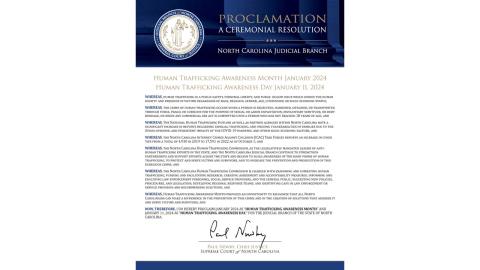Chief Justice Paul Newby Proclaims January 2024 as Human Trafficking Awareness Month for the Judicial Branch
Article contents

Supreme Court of North Carolina Chief Justice Paul Newby has proclaimed January 2024 as Human Trafficking Awareness Month and January 11 as Human Trafficking Awareness Day for the Judicial Branch by way of a proclamation.
Since 2010, January has been recognized as National Slavery and Human Trafficking Prevention Month by a presidential proclamation. The anniversary of the presidential proclamation, January 11, is known as National Human Trafficking Awareness Day.
“We set aside this month to help North Carolinians recognize and prevent the cruel crimes involved in human trafficking in our state,” said Chief Justice Newby. “Collaboration across state and local government and public awareness can help put an end to human trafficking in North Carolina.”
North Carolina has made significant progress over the last decade in reducing human trafficking, thanks largely to the efforts of the North Carolina Human Trafficking Commission (NCHTC). In June 2023, a new law was enacted that gives human trafficking victims a statutory right to seek permanent no-contact orders against their trafficker. It also keeps victims from being denied money from the Crime Victims Compensation Fund based solely on their conduct while they were being trafficked. The law also expands the definition of what is considered human trafficking and sexual servitude to include patronizing or soliciting someone, which mirrors the federal law.
MORE INFORMATION AND RESOURCES
The North Carolina Human Trafficking Commission is the legislatively mandated leader of anti-human trafficking efforts in North Carolina per S.L. 2013-368. The Commission is charged primarily with examining and combating human trafficking; funding and facilitating research; creating assessment and accountability measures; informing and educating law enforcement personnel, social services providers, and the general public; suggesting new policies, procedures, and legislation; and developing regional response teams and identifying gaps in law enforcement or service provision and recommending solutions. The Commission is housed within the North Carolina Administrative Office of the Courts and also works to increase awareness and foster partnerships to bring services to survivors.